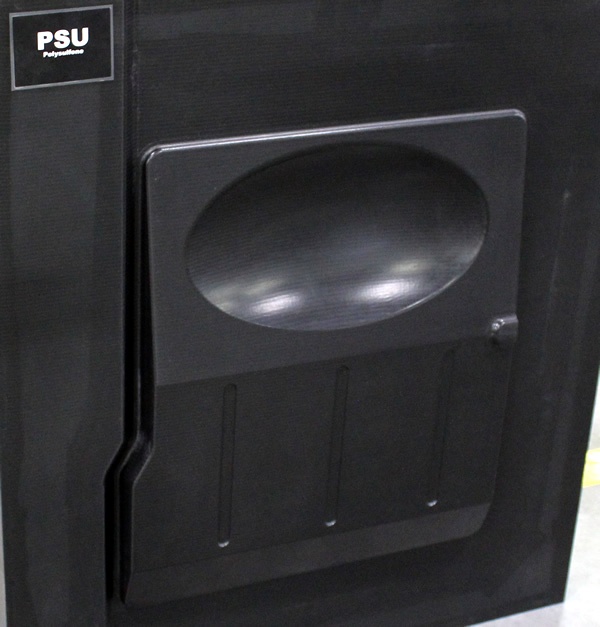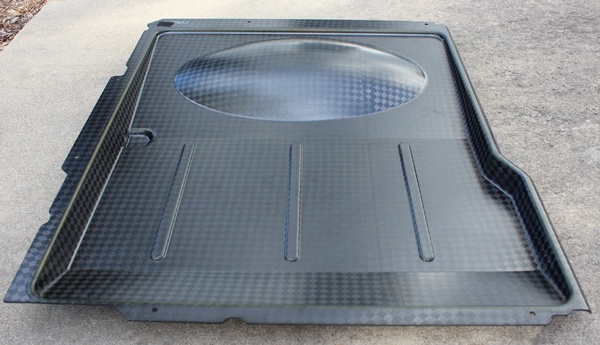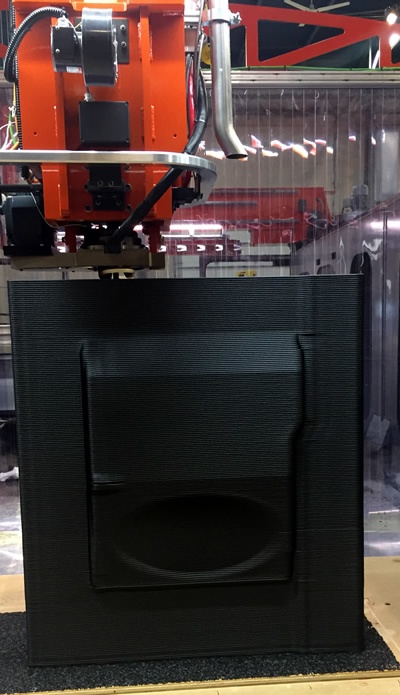A cooperative effort between Thermwood Corporation, Applied Composite Engineering (ACE), Techmer PM and Purdue University’s Composites Manufacturing and Simulation Center has produced a composite helicopter part using a 3D Printed Polysulfone (PSU) mold.

PSU mold printed and machined on a Thermwood 10'x20' LSAM®

Final Part from mold (oil drip pan for a Chinook Helicopter)
The Details
The mold was printed from Techmer supplied carbon fiber reinforced material and trimmed on Thermwood’s Large Scale Additive Manufacturing (LSAM®) machine. ACE produced a production part from the tool in an autoclave using normal production processes.
Despite the fact that Polysulfone appears to be an ideal material for this application, the participants believe this is the first time PSU has been 3D printed, since it processes at temperatures and requires torque levels above those needed for normal polymer extrusion. The extruder and print head on Thermwood's LSAM machine has been specially designed for ultra-high temperature, high-torque operation.

3D Printing Mold on Thermwood 10'x20' LSAM®
The part, an oil drip pan for a Chinook Helicopter, was molded in an autoclave at 275oF and 90 PSI. The printed mold held vacuum without the need for special coatings other than normal mold prep and release. With a Tg (glass transition temperature) of 372oF the participants believe that this particular PSU formulation may be able to process parts at up to 350oF which is adequate for about 95% of composite parts processed today. Additional tests will be performed to determine the suitability and durability of this material at this temperature. They also plan to evaluate Polyethersulfone (PES) which processes and operates at even higher temperatures.
The PSU mold and resulting part were displayed at the recent AM2017 Additive Manufacturing Conference in Knoxville.
Comparison vs Traditional Methods
Another interesting aspect of this collaborative effort is that a mold for the same part was built by ACE using traditional methods and the cost and build time was compared to making the same tool using additive manufacturing. The results were stunning.
The Results
Additive manufacturing material cost was 34% less and it required 69% fewer labor hours. Build time for the additive tool was 3 days versus 8 days for the conventional tool. If the part was larger, a support structure would be needed for the conventional tool which would add two days and more labor hours to the conventional process. A larger additive tool would not require a support structure.
The goal of this collaborative effort is to develop materials and processes to efficiently and reliably 3D print production composite tooling, capable of operating at elevated temperatures in an autoclave. These first successful results may indicate that they are very near reaching that goal.
Collaborative partners on this project
Applied Composites Engineering – Composites is their business focusing on aerospace. With nearly thirty years in the industry they have shown core competency rarely found in a company their size. This combination of capability and experience provides their customers with the benefits of a larger company supporting more sophisticated projects and larger production along with the speed and flexibility of a smaller enterprise.
Purdue’s Composites Manufacturing and Simulation Center – Their primary focus among others is to develop a comprehensive set of simulation tools that connect composites from their birth in manufacturing to predicting their useful life. They predict and measure the anisotropic deformation that occurs in printed elements, including a description of anisotropic element shape change during deposition in order to anticipate performance of the printed element.
Thermwood Corporation – Pioneer in CNC development, first company to build and sell a CNC router has moved aggressively into developing and building large scale additive manufacturing systems and industry leading software. Its LSAM (L-Sam) system prints and trims large to very large molds and tools that are solid, virtually void free and able to sustain vacuum without secondary coatings.
Techmer PM - A leading manufacturer of high-performance custom compounds used in the plastics industry, they seek to deliver value-added, breakthrough solutions to the OEM and processing communities worldwide. Working extensively with the additive manufacturing community they have developed materials ideally suited to the additive manufacturing process and have wide-ranging experience with additive manufacturing technology.



